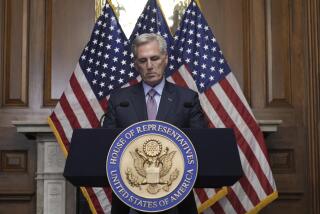It Was Only a Matter of Time for DeLay
- Share via
In 2002, House Majority Leader Tom DeLay wanted to redraw Texas’ district map to guarantee GOP gains. To pull this off, he needed Republicans to win control of the Texas Legislature, which would undertake the gerrymander.
DeLay went about raising large sums of corporate cash to plow into the Texas Statehouse races. Alas, Texas law prohibits corporations from donating money to candidates. So DeLay’s group, Texans for a Republican Majority, raised $190,000 in corporate donations and sent the money to a national Republican campaign group, which in turn donated the $190,000 to individual GOP candidates for the Texas Statehouse.
DeLay is facing possible indictment for this incident. But the above paragraph doesn’t contain the accusation. That’s DeLay’s defense. GOP lawyers say this money trading is a legal loophole. As DeLay told reporters, “When you have lawyers advising you every step of the way, it is very hard [for your opponents] to make a case stick.” This defense may or may not work, but either way it doesn’t quite meet the usual meaning of the word “innocent.”
And that’s the funny thing about the hot water DeLay finds himself in these days. He can make a plausible case that he’s legally innocent of everything he’s been accused of. Yet the things DeLay has admitted to are pretty bad on their own.
Like the controversy over letting a lobbyist pay for his overseas travel, which House rules prohibit. The lobbyist, Jack Abramoff, funneled money through conservative think tanks, which funded the trips. Nobody is questioning that part; the sticking point is that on at least one occasion Abramoff abandoned the pretense and picked up DeLay’s tab directly.
DeLay says he didn’t know that Abramoff paid the bill, and he probably didn’t. Still, he surely knew that Abramoff, his friend and ally, wasn’t showing up on trip after trip out of sheer coincidence.
DeLay’s story, then, is that he and Abramoff circumvented the ban on lobbyist-funded travel with a transparent ruse, only Abramoff slipped up, dropping the ruse without DeLay’s knowledge. Again: not guilty, perhaps, but hardly “innocent.”
Then this week, the Washington Post reported that yet another DeLay trip was financed by Russian business interests, also, of course, without DeLay’s knowledge. (House rules prohibit traveling at the expense of foreign agents.)
The purpose of the trip was apparently to secure DeLay’s support for funding the Overseas Private Investment Corp. Most conservatives scorned OPIC, which provides a subsidy for businesses investing abroad, as corporate welfare. The Russians who allegedly paid for DeLay’s trip had a strong interest in seeing the funding pass, and DeLay did not disappoint them. His spokesman, according to the Post, insisted the majority leader had a perfectly valid reason for his “yes” vote: “OPIC had the strong backing of the energy industry, including companies from Texas that received OPIC financing.”
This is funny given that DeLay’s loyal deputy, House Majority Whip Roy Blunt (R-Mo.), recently insisted with a straight face that his boss is “driven by philosophy.... I don’t think I’ve ever been in a room where he said, ‘We need to do this because some lobbyist needs it done.’ ” So now DeLay is reduced to essentially admitting he violated his principles at the behest of U.S. companies, which is merely sleazy, in order to deny violating his principles on behalf of Russian companies, which could be illegal.
It was probably just a matter of time before DeLay got nabbed for something or other. The hallmark of his career lies in pushing previously known social, ethical and legal norms further and lower than anybody else had ever had the guts or the indecency to push them.
Congress has always run something of a protection racket, but only DeLay was blunt enough to divide Washington’s special pleaders into “friendly” and “unfriendly” camps based on their donations and to invite them into his office to see the lists. It’s a tradition for the majority party in the House to run roughshod over the minority, but DeLay has taken majority tyranny to an extreme -- wantonly changing voting rules and forbidding Democrats from reading or debating legislation. Gerrymandering is a hallowed American tradition, but DeLay was the first to hit upon doing it without the cover of a census.
DeLay has yet to be judged, but this much is clear: If you constantly violate the spirit of the rules, it will be hard to avoid the charge that you violated the letter.
More to Read
Get the L.A. Times Politics newsletter
Deeply reported insights into legislation, politics and policy from Sacramento, Washington and beyond. In your inbox twice per week.
You may occasionally receive promotional content from the Los Angeles Times.










